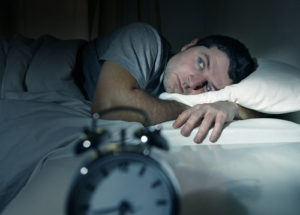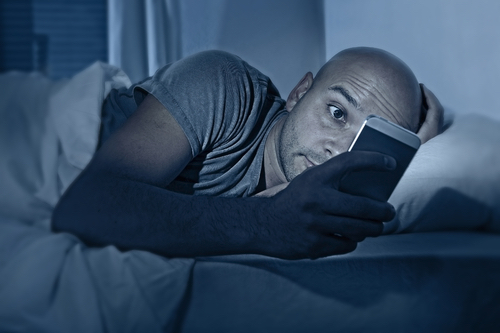
Marcos Mesa Sam Wordley / Shutterstock.com
The average young adult needs between seven and nine hours of sleep each night, but between homework, working a job, playing a sport, doing fun things with friends, and whatever else you might have on your schedule, you may end up getting way less each night. And, if you’re stressed out, worried about your grades, or generally have an active mind, you may find that even when you do manage to get to bed at a decent hour, it’s taking you entirely too long to fall asleep. You may also find that you’re waking up throughout the night and can’t fall back asleep, or you’re waking up too early in the morning. This is pretty normal if it happens every once in a while, but if it happens on a regular basis, you may be dealing with insomnia in college.
The symptoms of insomnia are what you might expect: a hard time falling asleep, difficulty staying asleep, waking up early and being unable to return to sleep, feeling tired throughout the day, triggering easily, experiencing trouble concentrating, and becoming preoccupied with your inability to sleep. Your insomnia is said to be chronic if it affects your ability to sleep for a minimum of three nights a week for three months.
Insomnia can be caused by any number of things:
- Depression
- Stress
- Anxiety
- Alcohol consumption
- Caffeine intake
- Smoking
- Irregular sleep schedule and naps
- Computer, phone, or television time before bed
- Eating a large meal close to bedtime
- Allergies and asthma
- Pain (chronic, arthritic, or acute)
If you already know that you suffer from a chronic illness (hyperthyroidism, sleep apnea, asthma, etc.) and you are suffering from an inability to fall asleep or stay asleep, it’s in your best interest to talk to your doctor. In some cases, prescribed medicines can cause changes in sleep patterns, and your physician will know if this is a common side effect of anything that you’re taking and how to combat it. Likewise, if you are worried that you may be depressed or anxious and that it may be the cause of your insomnia, talk to a mental health professional.
If you’re having trouble sleeping but don’t believe that you are clinically ill, there are a few things you can do to try to combat your insomnia in college:
1. Drink fewer caffeinated drinks.
The effects of coffee and soda aren’t at their height until approximately 40 minutes after you ingest them, and caffeine can stay in your system for up to 14 hours! This means if you have a Coke with lunch, you’re still going to be riding that wave of caffeine until well after dinner. Try to limit your caffeine intake to the morning if you’re worried about it affecting your sleep. If you’re a die-hard coffee drinker, try to cut back on the amount of coffee you’re drinking. The less caffeine in your system, the easier it should be to sleep. The same thing goes for nicotine; like caffeine, nicotine is a stimulant, meaning it wakes you up. If you’re a smoker, try to limit your intake in the hours leading up to bedtime.
2. Cut back on the alcohol.
Having a couple of drinks before bed might make it easier for you to fall asleep, but it’s not going to provide you with good quality sleep. While you are likely to fall into a deep sleep for the first half of the night after drinking, the amount of REM sleep (when you dream) that you get is limited because you’re likely to wake up multiple times in your sleep cycle (before reaching REM) due to the alcohol. Without enough REM sleep, you might have trouble learning new information and making memories.

Marcos Mesa Sam Wordley / Shutterstock.com
3. Limit your exposure to electronics before bedtime, or download the f.lux app.
Electronics give off a really harsh glow. If you don’t believe me, go into your closet, shut off the lights, and turn your phone on full brightness. It’s no wonder then, that they prevent the body from achieving a normal sleep schedule. The f.lux app will automatically dim your computer as the sun sets, so you’re no longer being exposed to the harsh light of electronics when your circadian rhythm wants to think about going to sleep. If you are doing work on your computer that requires full brightness, you can disable the app (though I urge you to do such work during the daytime). There are also settings on most smartphones that will allow your phone to automatically dim the brightness to match the ambient lighting. As for those of you who love television before bed, try reading a book instead!
4. Download the Sleep Cycle alarm clock.
This is an app that tracks your sleep throughout the night and can determine what stage of sleep you’re in by the amount of moving you do (in REM sleep, you’re in a paralyzed state) or the amount of sound you make. It has an alarm clock and, once you do manage to fall asleep, it will gently wake you up when you’re not in REM sleep, so as to preserve your deep sleep. Instead of feeling groggy when you wake up, you should feel relatively well-rested (depending on what time you managed to fall asleep).
Some other tips for insomnia sufferers include not taking naps in the afternoon (even if you’re tired), limiting your fluid intake before bed (so you don’t have to get up to use the bathroom), exercising for at least 150 minutes a week (if you’re worn out, it’s easier to sleep), and only using your bed for sleep (if you associate it with homework, eating, etc., you’re not making it a restful place).
If you’ve tried all of these options and find that you just can’t sleep, it’s probably about time to talk to a doctor. Your campus health clinic, a local doctor, or a mental health professional might be able to help! If a sleep disorder is suspected after an initial exam, you may be sent to a sleep lab. At the sleep lab, they’ll hook you up to monitoring equipment and then tell you to go to bed at the normal time. They’ll be able to tell you if there’s something physical or neurological going on and help you find an appropriate treatment.
-
Eight Ways to Stay Fit during the Winter Months without Hitting the Gym
-
The Truth about Caffeine
-
Why You Should Get a Flu Shot Now
-
Should I Take the Student Health Insurance or Stay on a Parent’s Plan?
-
How to Avoid Burnout in All Areas of Your Life
-
About Greek Life and Sexual Assault on College Campuses
-
Everything You Need to Know about Crohn’s Disease
-
Grocery Shopping for Finals Week: Food to Keep You Full and Focused
-
The Importance of Physical Education and Exercise
-
Seizures and Seizure Disorders
-
Preparing to Leave for College with a Chronic Illness
-
Finding Help for Alcohol and Drug Addiction: Where to Start and When to Reach Out

